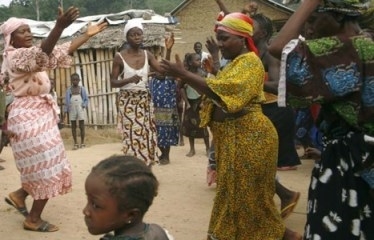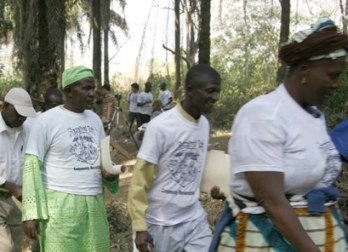 |
For more than 11 years, civil war ravaged Sierra Leone. Families were torn apart and entire villages were destroyed. When the war ended in 2002, a United Nations criminal court tried to bring justice to the region by prosecuting 9 men they deemed most responsible for fomenting the conflict. However, the millions of dollars spent on this court to prosecute the men never reached the ordinary villagers who were impacted by the war. A reconciliation process was implemented to try and bring peace to Sierra Leone, but like the criminal court it did little to heal their wounds. The war was still on their minds, and for many people the pain was still fresh: “You walk down the same footpath as someone who killed your parents, who burned down your house. But you are powerless.”
Before the war, the communities worked together as though they were a large family. People would resolve their problems within the community. They would sit together in a circle, discuss their problems, and reconcile their differences. They would share their minds, and see the way forward. The lack of an efficient reconciliation process made the people of Sierra Leone realize that they needed a better way to resolve their problems. In 2007, they started designing a new reconciliation program, based on the tradition of resolving problems within the security of a family circle. They named the new program Fambul Tok, or Family Talk.
 |
Fambul Tok is a community program that brings the victims and perpetrators of violence together to talk about the horrors and pain of the eleven-year civil war. It is based on the realization that reconciliation and forgiveness is not a one-time event, but a long-term process. Participants gather around truth-telling bonfires to talk about the war and how they were impacted. They share stories of their experiences so they can understand each others’ perspectives, discuss the meaning of forgiveness, and determine whether they are ready to reconcile. Following the ceremonies the people take part in various community activities in an effort to support and sustain the reconciliation process. These include radio clubs, football games, community farms, and other projects where newly reconciled individuals can work together.
Fambul Tok is not influenced by the concepts of blame and retribution, but rather by the African tradition of communities functioning as a whole, with each member playing a role to achieve peace. Since 2007, Fambul Tok has spread and is now used in 161 communities throughout the country to resolve conflicts. Though the reconciliation process takes time, Fambul Tok is helping to build healthy communities on a foundation of peace.
“Gradually, gradually development is coming on. You see victims and perpetrators coming together, forming groups, going into communities, making farms … You see them coming together, doing joint labor – which is actually a sign that there is light at the end of the tunnel. Because these people were far apart, they were pointing fingers, it’s you who did this, it’s you who did that – you burned my house, you killed my father. But now they are coming together, they’re coming together to rebuild communities again. They are not talking about ‘We want you to incriminate these guys,’ they’re talking about coming together and rebuilding their communities and the district as a whole.” — James Fallah, Journalist, Kailahun
Page created on 2/28/2015 7:20:48 PM
Last edited 1/7/2020 9:21:11 PM
